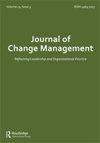SDG localization: Mobilizing the Potential of Place Leadership Through Collective Impact and Mission-Oriented Innovation Methodologies
IF 3
Q2 MANAGEMENT
引用次数: 1
Abstract
ABSTRACT The wellbeing of people, places and the planet relies upon our collective ability to resolve the grand challenges framed in the United Nations Sustainable Development Goals (SDGs). This paper focuses on opportunities for place leadership theorizing and practice to progress localization as one pathway to advance the SDGs. It seeks to bridge the theory-practice divide that currently limits the utility of place leadership research by highlighting two implementation methodologies – Collective Impact (CI) and Mission-oriented Innovation (MOI). These methodologies have gathered momentum amongst practitioners but received comparatively little academic attention. We argue that both methodologies have potential to support place leaders to address key barriers to SDG localization, particularly, centring equity, enacting multi-stakeholder partnerships, generating data and stories, and contributing to systems change. This paper suggests that future place leadership theorizing should learn from and support CI and MOI practice and contribute to collective efforts to localize the transformational change envisioned by the SDGs. MAD statement Drawing upon practitioner and theoretical literatures this paper identifies critical opportunities to advance both SDG localization and place leadership theory by leveraging and learning from the rapidly growing body of Collective Impact (CI) and Mission-oriented Innovation (MOI) initiatives globally. An analysis of these relatively under-studied methodologies is offered and opportunities to apply or learn from them to overcome key barriers to SDG localization are identified. The paper also offers suggestions as to how place leadership theory could, in turn, enhance the continued maturation of CI and MOI and advance SDG localization.可持续发展目标本地化:通过集体影响和以使命为导向的创新方法调动地方领导的潜力
摘要:人类、地方和地球的福祉取决于我们共同解决联合国可持续发展目标(SDGs)中提出的重大挑战的能力。本文关注地方领导理论和实践的机会,以推进本地化,作为推进可持续发展目标的一条途径。它试图通过强调两种实施方法——集体影响(CI)和使命导向创新(MOI),弥合目前限制地方领导力研究效用的理论与实践分歧。这些方法在从业者中获得了发展势头,但在学术上相对较少受到关注。我们认为,这两种方法都有可能支持地方领导人解决可持续发展目标本地化的关键障碍,特别是以公平为中心,建立多方利益相关者伙伴关系,生成数据和故事,并为系统变革做出贡献。本文建议,未来的地方领导理论应该学习并支持CI和MOI实践,并为集体努力本地化可持续发展目标所设想的转型变革做出贡献。MAD声明本文根据从业者和理论文献,确定了通过利用和学习全球快速增长的集体影响(CI)和使命导向创新(MOI)举措来推进可持续发展目标本地化和地方领导理论的关键机会。对这些研究相对不足的方法进行了分析,并确定了应用或学习这些方法以克服可持续发展目标本地化的关键障碍的机会。本文还就地方领导理论如何促进CI和MOI的持续成熟和推进SDG本地化提出了建议。
本文章由计算机程序翻译,如有差异,请以英文原文为准。
求助全文
约1分钟内获得全文
求助全文
来源期刊

JOURNAL OF CHANGE MANAGEMENT
MANAGEMENT-
CiteScore
6.60
自引率
20.00%
发文量
14
期刊介绍:
Journal of Change Management is a multidisciplinary and international forum for critical, mainstream and alternative contributions - focusing as much on psychology, ethics, culture and behaviour as on structure and process. JCM is a platform for open and challenging dialogue and a thorough critique of established as well as alternative practices. JCM is aiming to provide all authors with a first decision within six weeks of submission.
 求助内容:
求助内容: 应助结果提醒方式:
应助结果提醒方式:


